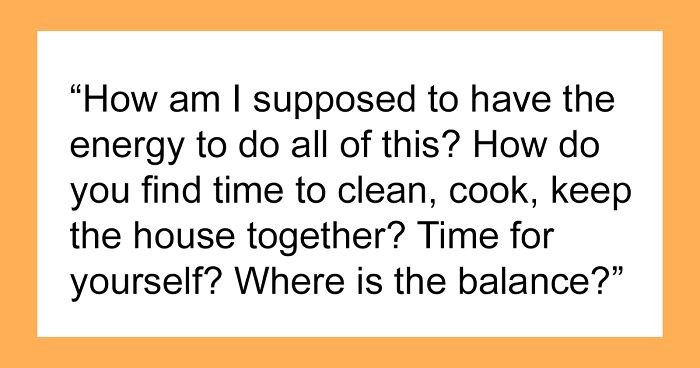
Tired Millennial Asks How Her Mom And Others Managed To Work And Raise Kids, Sparks A Debate
The amount of work it took to raise you doesn’t really make sense until you have kids of your own. Naturally, one might start wondering how exactly an adult takes care of kids and goes to their job every single day.
TikToker and mom FamPhiji shared her difficulty in understanding how mothers of past managed to have careers and do the majority of childcare at the same time. People shared their stories and thoughts in the comments. Bored Panda has reached out to FamPhiji via email and will update the story when she gets back to us.
More info: TikTok
- TikToker FamPhiji questions how '90s moms balanced work and childcare
- Working '90s moms juggled careers and child care.
- Sociologists identify 'motherhood penalty' in careers.
- Comments reveal no secret, just continuous hard work.
Working moms rarely have time for a break
Image credits: Ketut Subiyanto / Pexels (not the actual photo)
TikToker and mother FamPhiji wondered what was her own mother’s secret
Image credits:_phiji
“How were you able to wake up, get yourself dressed, get me ready, take me to daycare or school, go to work, work a full shift, get off, pick me up, take me home, make sure I was fed, make sure I was bathed, put me to bed, wake up and do it all over again. For years and years and years.”
Image credits:_phiji
“I’m just not seeing it. My mom was so serious about going to work that if I was sick, I had to go to school for at least half a day. Because I’m not messing up my attendance and she has got to go to work. I was that girl that had perfect attendance every year”
Image credits:_phiji
“But I’m tired. I don’t know if I can do this. How am I supposed to have the energy to do all of this? Where do I find the patience? How do you find time to clean, cook, keep the house together? Time for yourself? Where is the balance?”
Image credits:_phiji
“I’m not seeing the work-life balance. There is not enough hours in the day to do all this. There’s not enough hours in the day. Math is still not mathing to me. I don’t know.”
Image credits:_phiji
You can watch the full video here
@_phiji I’m tired. #momtok#momsoftiktok#toddlermom#toddlertok#millenialmom#momlife#momstruggles#fyp♬ original sound – FamPhiji ✨
Image credits: Vidal Balielo Jr. / Pexels (not the actual photo)
For some reason, having kids is seen as a minus in many employer’s eyes
On top of the practical difficulties working moms had to go through, the sad reality is that even when it became more normalized for women to participate in the workforce, many companies still, explicitly and in more hidden ways, discriminated against working moms. Indeed, in some cases, particularly before equal opportunity laws were passed, certain organizations even had pregnancy bans for some positions.
Some employers see motherhood as a “distraction” and a financial risk to the company. They conjure up the costs of maternity leave, loss of productivity due to, for example, a sick child, and sometimes a very old-fashioned and misguided belief that mothers simply can’t do certain jobs. All of this created and possibly continues to create barriers for working mothers who want to advance their careers.
Sociologists call this the motherhood penalty, arguing that moms start from a disadvantaged position. This can manifest itself in a number of ways, from a wage gap to being overlooked for promotions. After all, some managers see parenting as something that might get in the way of leading a team and making decisions. Never mind the fact that mothers are probably better equipped to handle people and most management positions are hardly as time-intensive as being a “regular” worker.
Image credits: Jep Gambardella / Pexels (not the actual photo)
Working moms often faced and still face hiring discrimination
Even worse, a mother might not be hired over a childless person for these exact reasons. Never mind the fact that most of us were raised by working moms, some hiring managers still manage to overlook their own lived experiences and just give in to stereotypes. This isn’t just some urban legend, studies of hiring trends have shown that, more often than not, just the detail that one employee was a mom was enough to sway hiring managers to go with another candidate.
It doesn’t help that, in contrast, having kids is generally seen as a plus for a man. This is often referred to as the fatherhood bonus, where being a dad is seen as prestigious. Even “worse” in terms of inequality, the fact that a man has kids often makes him more eligible for a bonus in the eyes of many organizations.
Image credits: Liza Summer / Pexels (not the actual photo)
Many mothers don’t actually get the support they need
As was implied in the video, for many of these women, raising a child was a solitary task. While sometimes, they were single mothers, the vast majority of families, even with an able-bodied father, still put the work of taking care of a child on the shoulders of the mother. Who would then also be penalized in her career just because she wanted to have a family.
This just covers the “career” part of being a working mother. They have to overcome all of these hurdles while taking care of one or more children, which some see as a full-time job in of itself. While the video is posed as a question, many comments, some of which can be found below, state the obvious, that there isn’t actually a secret, just a mountain of constant work.
Many commenters gave some suggestions as to how the times have changed
Other working moms also shared their experiences
While some argued that there was no secret, just lots of hard work
Poll Question
Thanks! Check out the results:
tHiNgS wErE eAsIEr tHen...no, they weren't. My mum raised us in the 70s and 80s working two jobs. I raised my daughter and it's been as exhausting as it gets. And the next generation will feel exactly the same. It's not a generation issue, but a class one. Working class folks can't pay to get a lot of things done so they need to do them themselves, which negatively impacts their work/life balance.b
Speaking as a 80's and early 90's kid. Kids with single parents spent a lot of time fending for themselves. We left an empty house in the morning and came back to an empty house after school. We spent a lot of time alone and with our friends. We had a lot of adventures that wouldn't be acceptable by today's standards. You learned to solve your own problems because no one was going to help you. My mom had two modes indifferent and nuclear meltdown so you learned to figure things out on your own. We all had places to live, food, and clothes but relatively little interaction with our parents. My mom made sure we had a cooked dinner and food in the house. We moved a lot, you do that when you're poor. She sacrificed for us and did her best, working a second job for a couple years. I'm pretty sure she dealt with depression and sought treatment but we don't talk about those things in our family. I had a bunch of chores laundry, trash, dishes and kitchen, cat box, cleaning.
tHiNgS wErE eAsIEr tHen...no, they weren't. My mum raised us in the 70s and 80s working two jobs. I raised my daughter and it's been as exhausting as it gets. And the next generation will feel exactly the same. It's not a generation issue, but a class one. Working class folks can't pay to get a lot of things done so they need to do them themselves, which negatively impacts their work/life balance.b
Speaking as a 80's and early 90's kid. Kids with single parents spent a lot of time fending for themselves. We left an empty house in the morning and came back to an empty house after school. We spent a lot of time alone and with our friends. We had a lot of adventures that wouldn't be acceptable by today's standards. You learned to solve your own problems because no one was going to help you. My mom had two modes indifferent and nuclear meltdown so you learned to figure things out on your own. We all had places to live, food, and clothes but relatively little interaction with our parents. My mom made sure we had a cooked dinner and food in the house. We moved a lot, you do that when you're poor. She sacrificed for us and did her best, working a second job for a couple years. I'm pretty sure she dealt with depression and sought treatment but we don't talk about those things in our family. I had a bunch of chores laundry, trash, dishes and kitchen, cat box, cleaning.

 Dark Mode
Dark Mode 

 No fees, cancel anytime
No fees, cancel anytime 










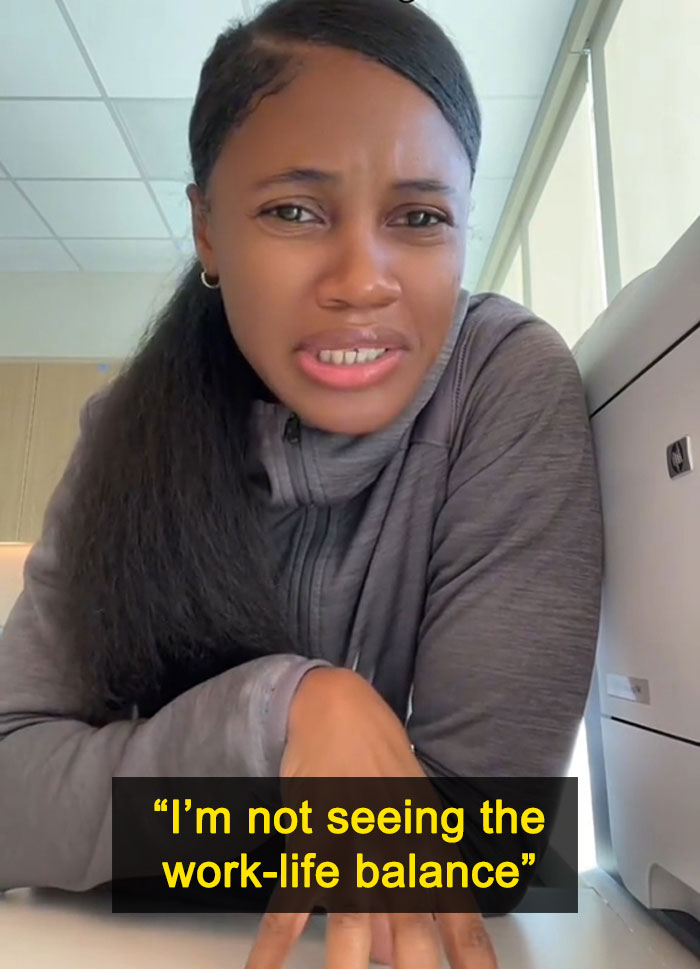

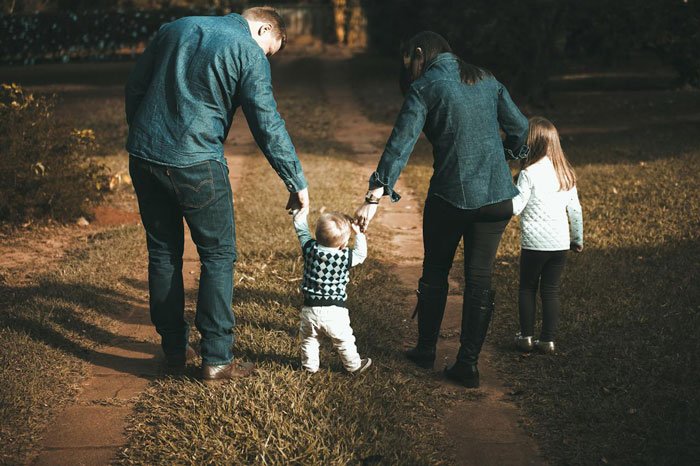
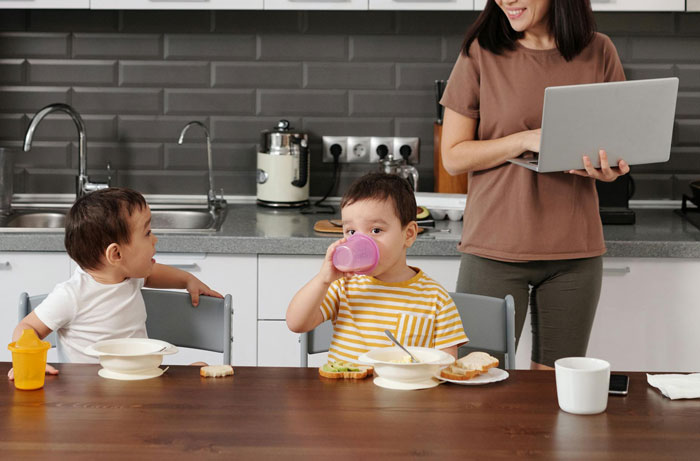















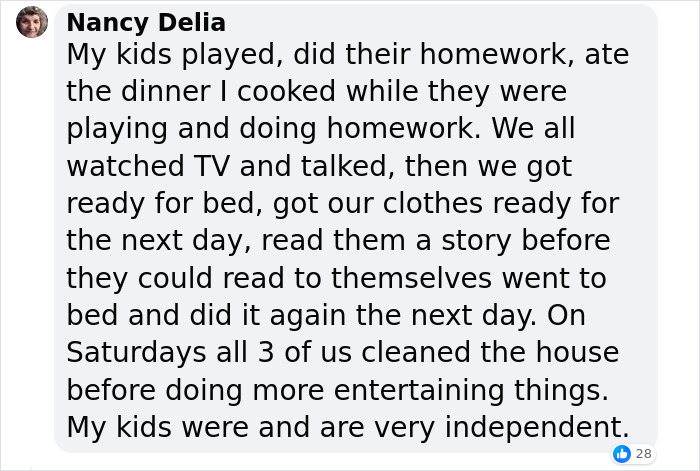
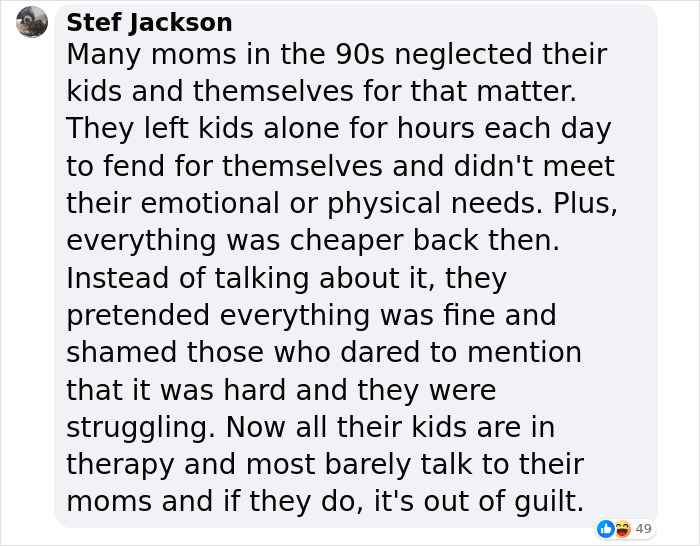
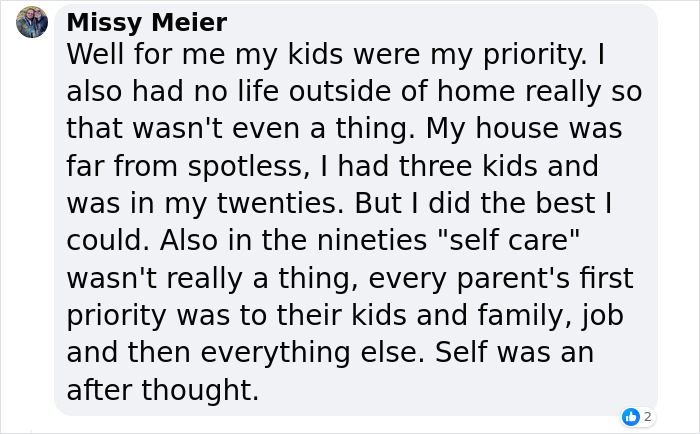

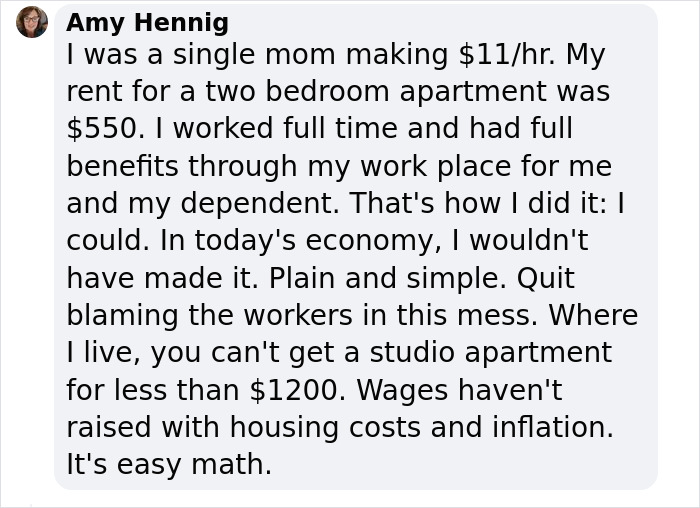

















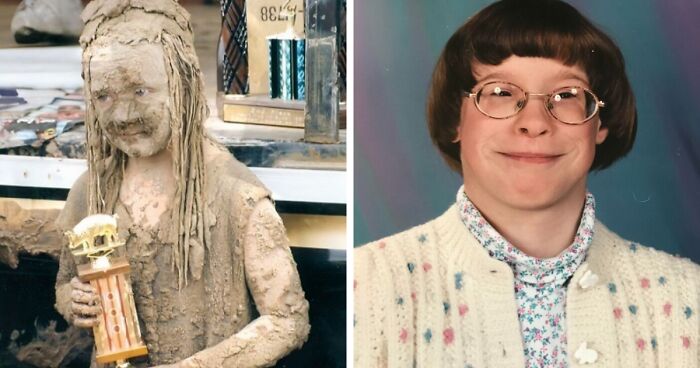

































22
23